Acer Swift Go 14: One-minute review
If we were to compare the Acer Swift Go 14 to a car, it would be like driving a Honda Accord. It’s a solid laptop that looks nice, but is pretty far from premium. There are some aspects of it that even come off a little cheap. However, it does the job it’s supposed to for the majority of those looking for a laptop.
In that regard, it could be considered one of the best laptops for the average joe as it’s priced very reasonably and comes with enough power to handle daily tasks for the next three to five years.
Plus, it comes with a few interesting extra features such as its built-in Copilot AI. Even though that’s technically a Microsoft thing, Copilot comes with its own processing unit as well as a physical button on the keyboard to call it up. The multi-gesture touchpad as well as the feature-filled webcam and mic are also nice touches.
If budget isn’t an issue, then you might not find the Acer Swift Go 14 to be among the best Ultrabooks to choose from. But, considering how inflation has reached us all, most of us looking for a daily laptop for emails, streaming, and the like are probably trying to stretch that budget as much as possible. And, with that in mind, the Acer Swift Go 14 is an easy recommendation.
Acer Swift Go 14: Price & availability
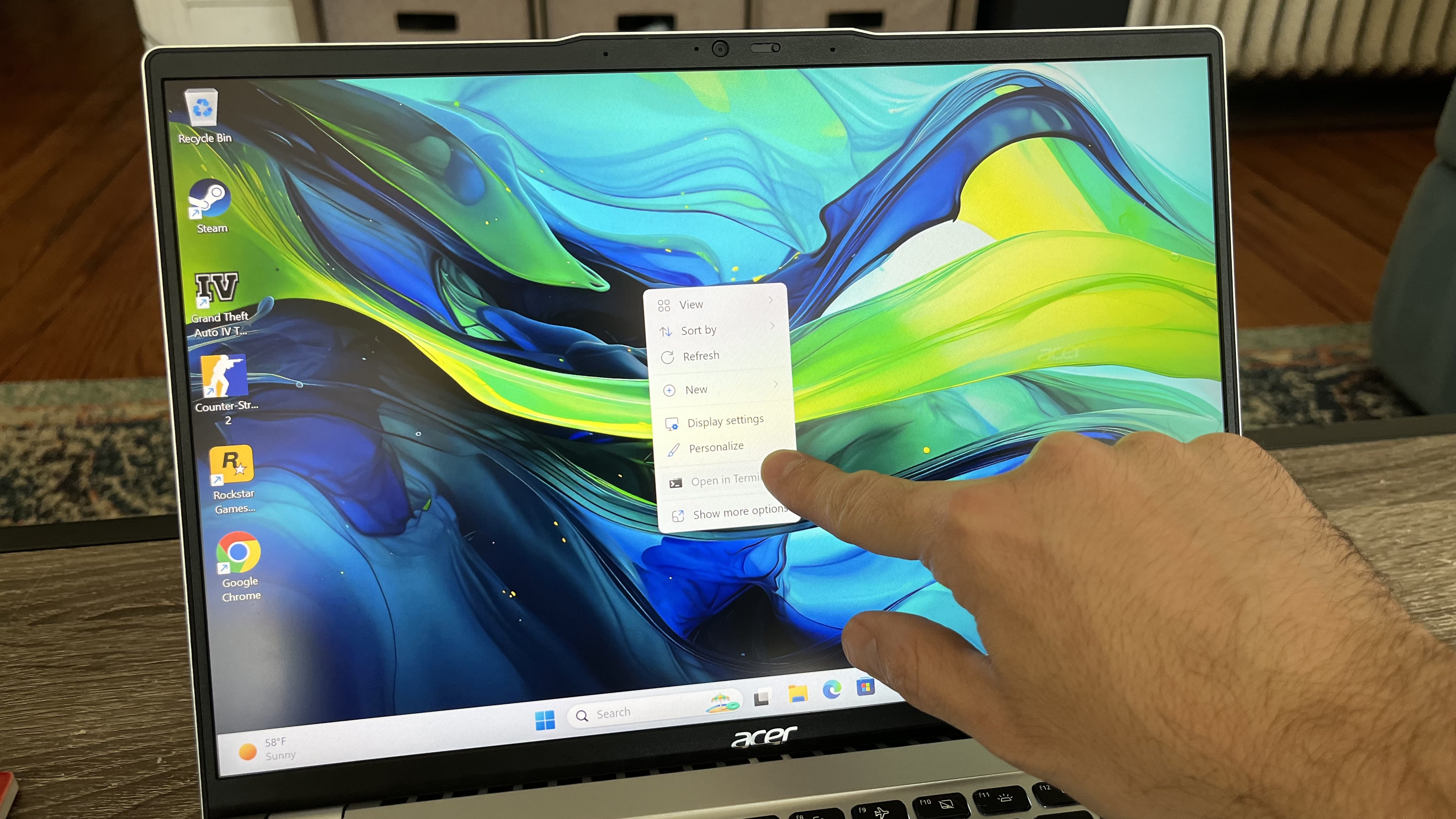
- How much does it cost? Starting at $799.99 (about £640.00 / AU$1,230.00)
- When is it available? Available now
- Where can you get it? Available in the US, UK and Australia
The Acer Swift Go 14, reviewed here (model number SFG14-73/T), and available at Costco for $799.99 (about £640/AU$1,230) as of the beginning of May, is priced perfectly. If you don’t have a Costco membership, you’ll have to spend at least $949.99 (about £760 / AU$1440) to get a model with the same CPU, RAM, and display, and you’ll have a hard drive with half the space.
Of course, there is a model that goes for $829.99 (about £670 / AU$1260), but you’ll end up with the weaker Intel Core Ultra 5 125H CPU. If you’re in the UK or Australia, you really only have access to more expensive versions that come with a 2.8k resolution OLED display, which retail for £1,399.99 / AU$1,899 (about $1260.00).
Just be aware that the models with the Intel Core i5 or i7 CPUs are technically of the previous generation, even if they’re very close in terms of performance – they’re just not quite as robust in terms of their AI capabilities as the ones with the Intel Core Ultra SoCs with Intel Arc graphics and dedicated NPU.
If you need to differentiate, the newer models whether through Costco or direct have a 73 in the model name as opposed to 72 or 71, i.e. the one reviewed here is SFG14-73/T while the maxed out one mentioned in the paragraph above is the SFG14-71-785V.
The Apple MacBook Air 13-inch (M3) is still the standard bearer for these types of more affordable Ultrabook models despite not being a Windows laptop. Yet, the starting price is $1,099 / £1,099 / AU$1,799. And, once you get into any kind of upgrades, the price goes way up. Plus, this base model comes with 8GB 'unified memory.' While Apple does a great job of creating efficient laptops, that’s still too little in this day and age. That puts the Acer Swift Go 14’s price into a proper and very positive context.
If you really need to go cheaper than the Acer Swift Go 14, there are some models out there worth considering, such as the Lenovo IdeaPad Slim 3i. It has a good touch screen, some security features, and enough power for day-to-day work, even if it’s weaker than the Acer Swift Go 14, which you’ll notice more near the end of its life cycle as it will struggle more to keep up. And, it goes for a cheaper $659.99 / £518 (about AU$970).
- Value: 4.5 / 5
Acer Swift Go 14: Specs
Though the Acer Swift Go 14 came in a number of configurations in previous generations, the current one (which is not that big of a leap from the previous i5 or i7-powered generation) has a very small number of models.
In the US, the only difference is either getting one with an Intel Core Ultra 5 or Core Ultra 7 SoC for the non-Costco models, or getting the Costco model, which is both cheaper and comes with a bigger hard drive.
The Acer Swift Go 14 is slightly different in the UK and Australia as it comes with a 2.8k resolution OLED screen. Of course, it’s more expensive as well.
Acer Swift Go 14: Design

- Decidedly mid-tier in build quality and aesthetics
- Powerful enough for most people’s needs
- Keyboard is fine but touchpad has a lot going for it
As a mid-tier laptop, the Acer Swift Go 14 comes with its set of compromises starting with the fact that it has an aluminum lid and top plate but is plastic underneath, keeping this laptop from feeling truly premium. But if you don’t look too closely, its silver and black colorway looks good enough. And, at a little over 3 lbs, it’s fairly light – this is essentially a mid-range Ultrabook.
As far as components go, again it’s not going to be the most robust computer out there. However, if you consider who this is meant for, it’s more than robust enough, coming with an Intel Core Ultra 7 155H CPU, integrated Intel Arc graphics, 16GB DDR5 RAM, and a substantial 1TB SSD.
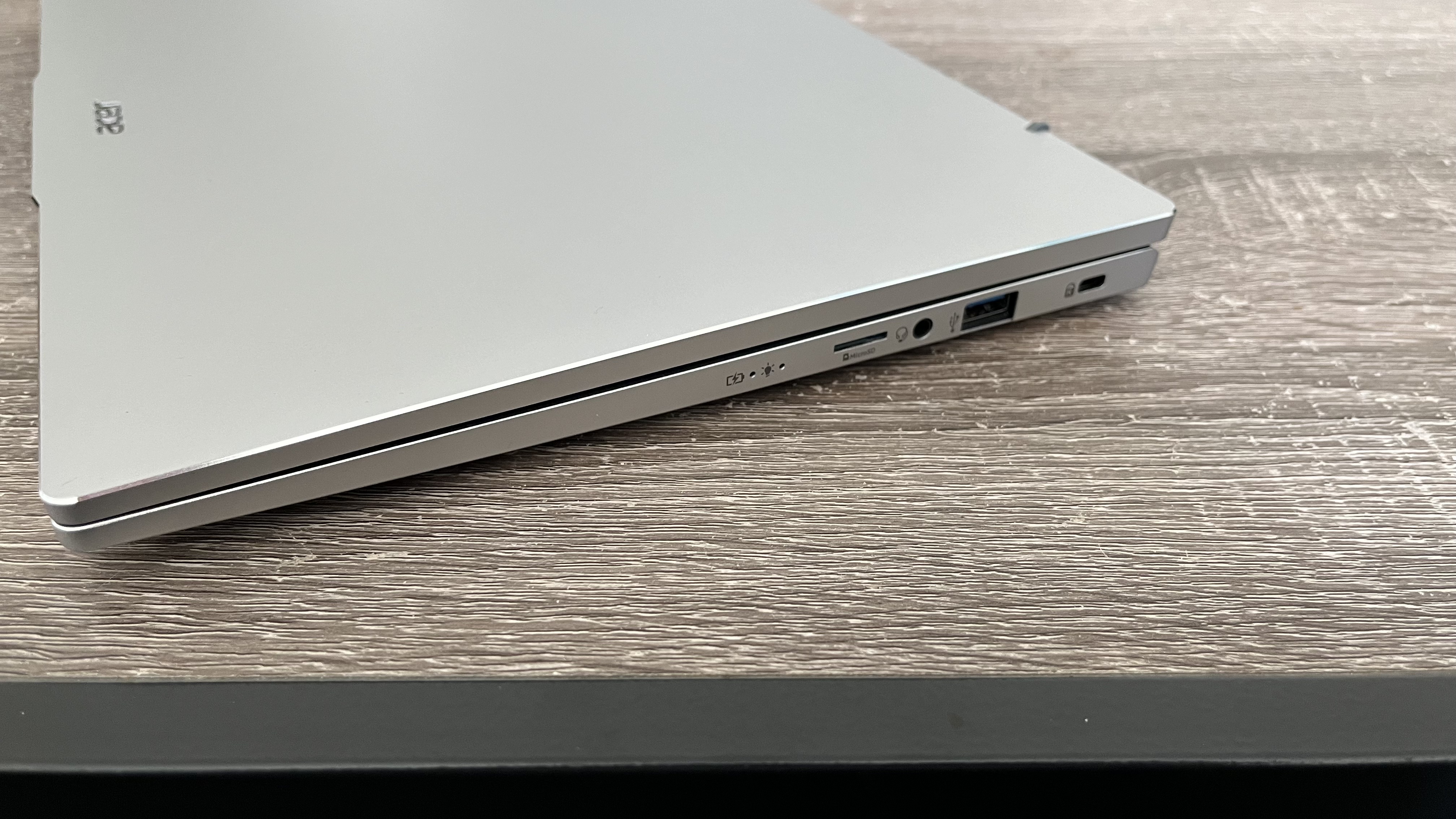
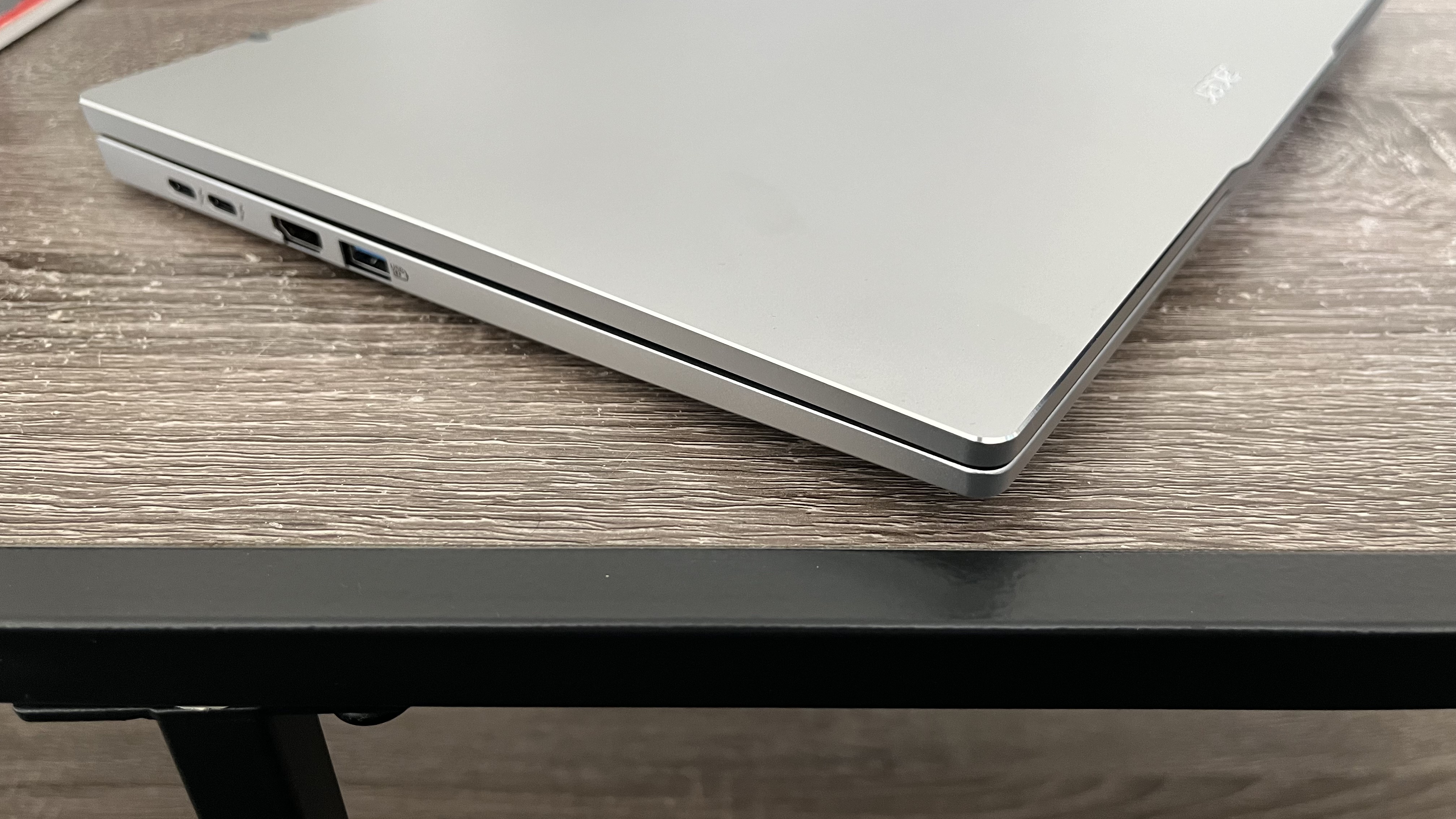
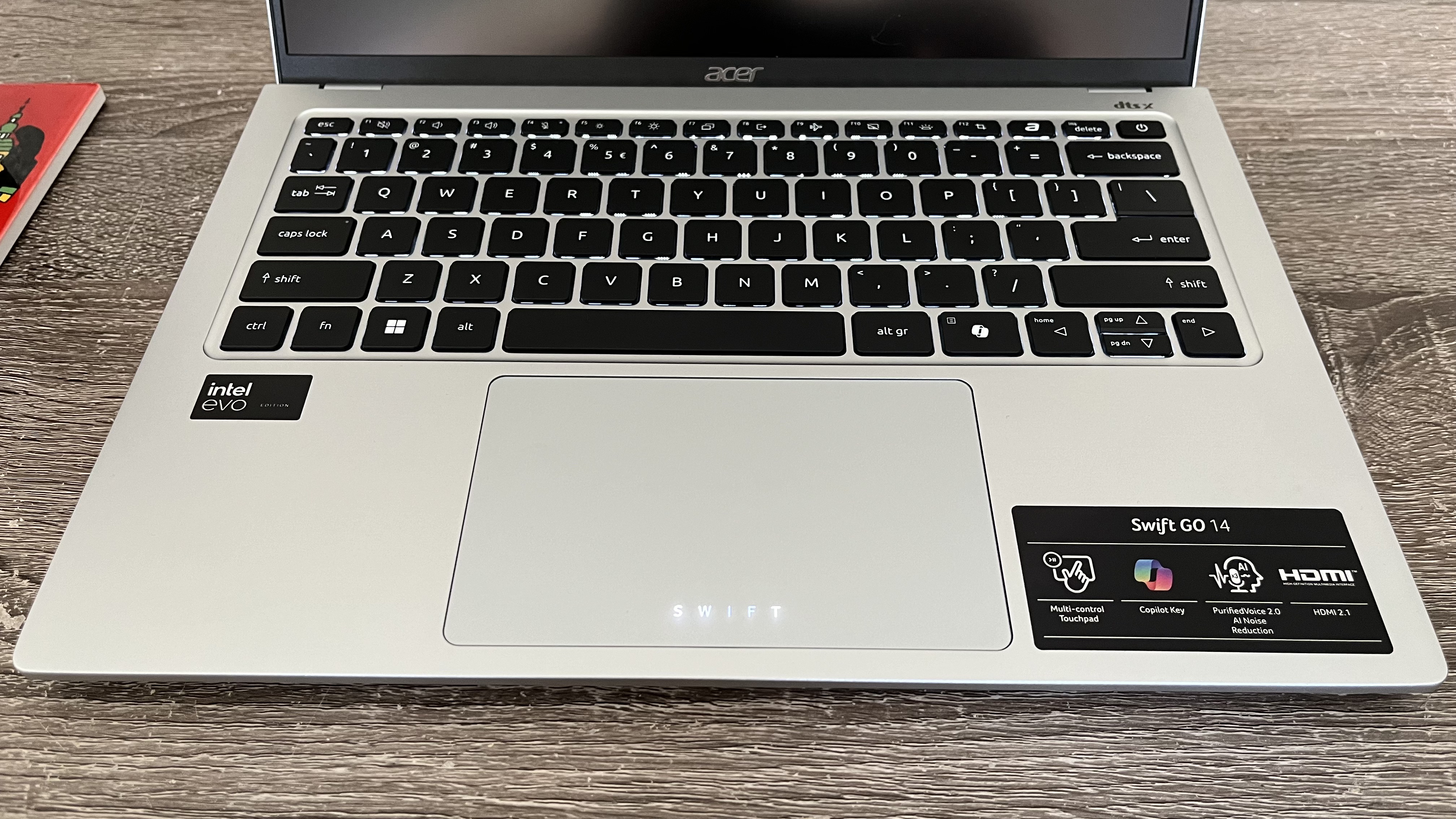
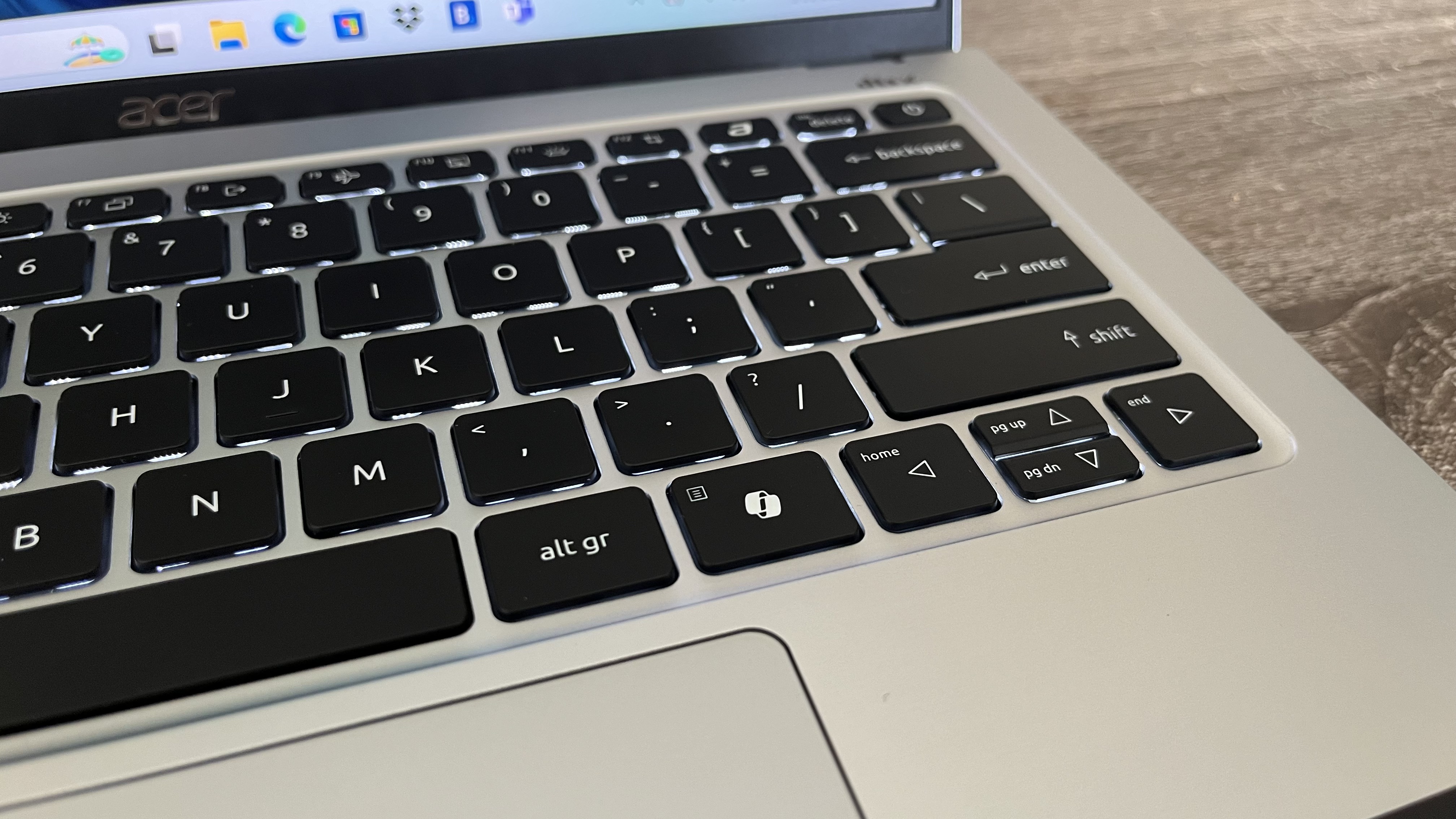
If you want a computer that’s good enough for day-to-day activity that doesn’t include heavy editing or gaming, the Acer Swift Go 14 should do the job for at least a few years. Plus, it’s somewhat future-proof, or at least forward-looking with the fact that it comes with an Intel AI boost neural processing unit, which does the AI processing that you’ll mostly access through Copilot (more on that later).
The screen is capable here, but not quite wow-level, though there are some impressive upgrade options. The display that accompanies the review model is an IPS 1920x1200p 16:10 ratio one with a standard 60Hz refresh rate. It doesn’t do HDR but can handle HDR streaming.
The keyboard and touchpad are serviceable, but nothing special. Typing out this review on the Acer Swift Go 14 somewhat makes me miss my MacBook Pro, as the key presses are a bit shallower here. That said, you won’t find either the keyboard or touchpad to get in the way of your day-to-day activities. While the backlight on the keyboard is on the weaker side, a bright “SWIFT” lights up on the trackpad when the laptop is powered up – a nice touch, in my opinion.
One more point in favor of the touchpad is the fact that it registers all sorts of gestures, which can be customized to a degree in the settings, to the point where you use three or four fingers at a time for additional commands such as showing the desktop or adjusting the volume.
- Design: 4 / 5
Acer Swift Go 14: Performance
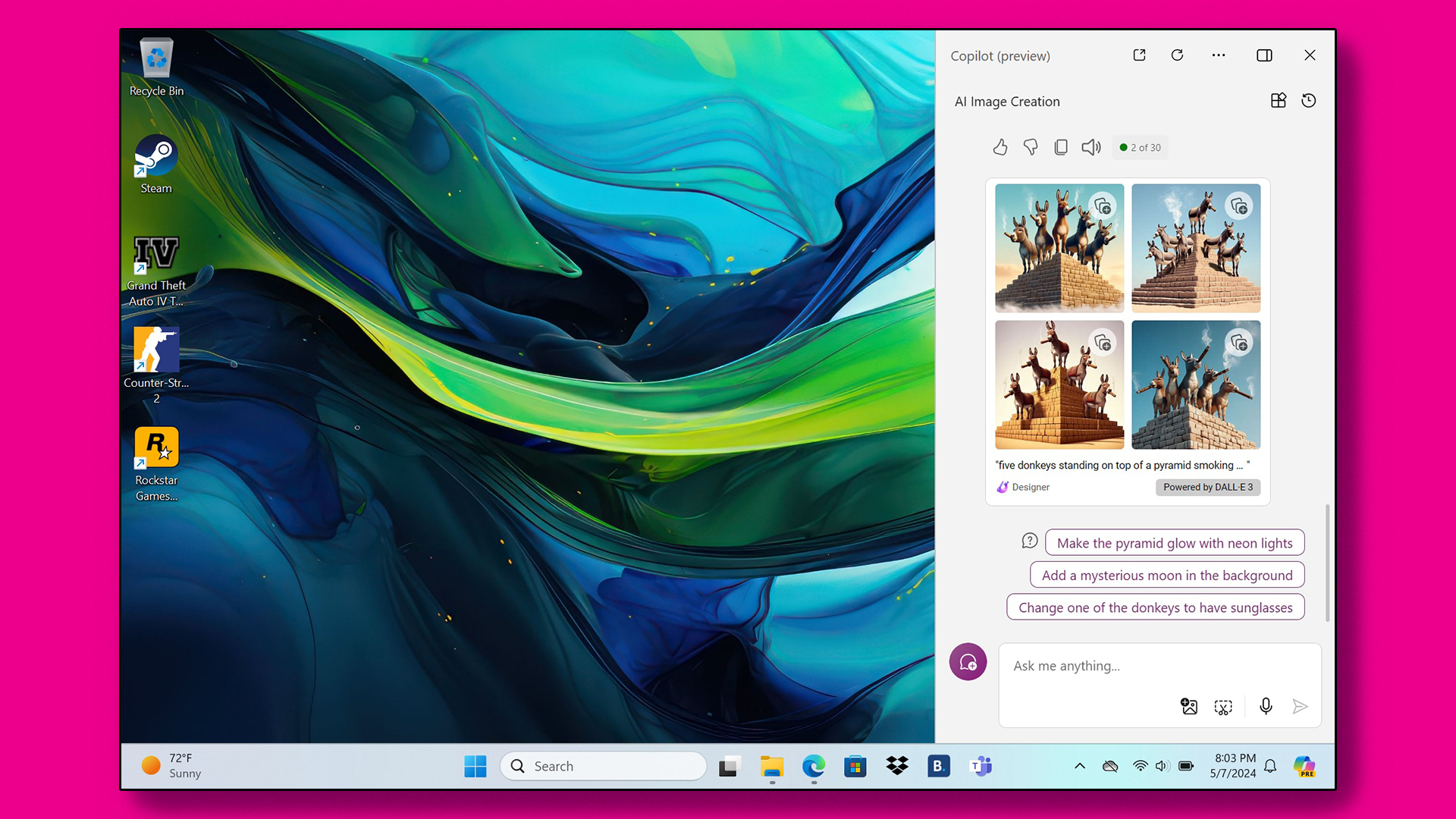
- Enough performance for most
- Copilot AI is a nice, if extraneous addition
- Webcam and mic are very good
Here is how the Acer Swift Go 14 performed in our suite of benchmark tests:
3DMark: Night Raid: 27,154; Fire Strike: 8,046; Time Spy: 3,827
GeekBench 6.1: 2,364 (single-core); 12,612 (multi-core)
25GB File Copy: 15.05 seconds
Handbrake 1.6.1 (4K to 1080p encode): 5:12 minutes
CrossMark: Overall: 1,809 Productivity: 1,750 Creativity: 1,921 Responsiveness: 1,670
Sid Meier's Civilization VI: Gathering Storm (1080p): 36.214 fps
Web Surfing (Battery Informant): 8:25:23
The Acer Swift Go 14 is not a powerhouse, nor is it meant to be. This is the kind of portable computer for someone who doesn’t want to pay too much money, but still wants something robust enough to handle their daily workload for a few years without hassle. And, its performance lines up nicely there.
It won’t have any trouble running multiple tabs at the same time, and is even able to handle some basic gaming like CS:GO, despite not having discrete graphics. You won’t do any heavy lifting with this laptop, but its performance is more than enough for most people, especially since it comes with some good quality-of-life inclusions.
Now, whether the built-in Copilot AI that’s replaced Cortana, and has its own dedicated button, is one of those QoL inclusions worth paying for really depends on how much you rely on or want to rely on AI.
It certainly makes searching for solutions when troubleshooting issues, whether computer-related or not, a bit easier. However, it’s not that much more robust than what you can find googling. It just happens to all be in one place. As things with generative AI evolve, we’ll get a good idea of how integral something like Copilot really will be to the user’s end experience. For me, it was more of a curiosity than anything else.
What I’m more impressed by is the nice, bright touch screen. It has a slightly better than 1080p resolution (1920 x 1200) and supports HDR streaming though not HDR in general. Still, it’s enjoyable enough when watching something like Shogun with a very crisp, clear video quality that produces a good accurate color range, at least with sRGB (109% to be specific), though it doesn’t quite have the color gamut coverage for much editing work with its almost 78% DCI-P3 coverage.
Still, that’s not what this computer is for. And, if you really want to upgrade the viewing experience without dumping too much money on a computer, you can always go with an upgraded Acer Swift Go 14 with a higher-res OLED screen.
Another area that surprised me was the sound quality. While lacking bass or a lot of volume, it is surprisingly decent for a fairly slim laptop. It doesn’t sound boxy like most thinner laptops. Instead, you get a fairly unadulterated sound (all things considered).
Lastly, the conferencing capabilities are very good here. The webcam, with its 1440p at 30Hz resolution, is quite sharp. And, despite that lower refresh rate, has a 60Hz flickering reduction so that you look pretty smooth without a lot of noise in the image. I also appreciate the fact that it has a physical privacy shutter.
Plus, Acer paired it with AI noise reduction technology implemented on the mic, so you’ll be heard as clearly as you’re seen. I particularly appreciated the fact that this laptop would ask if I wanted to use a conference-style or personal-style noise reduction, though it does ask every single time.
- Performance: 4.5 / 5
Acer Swift Go 14: Battery life
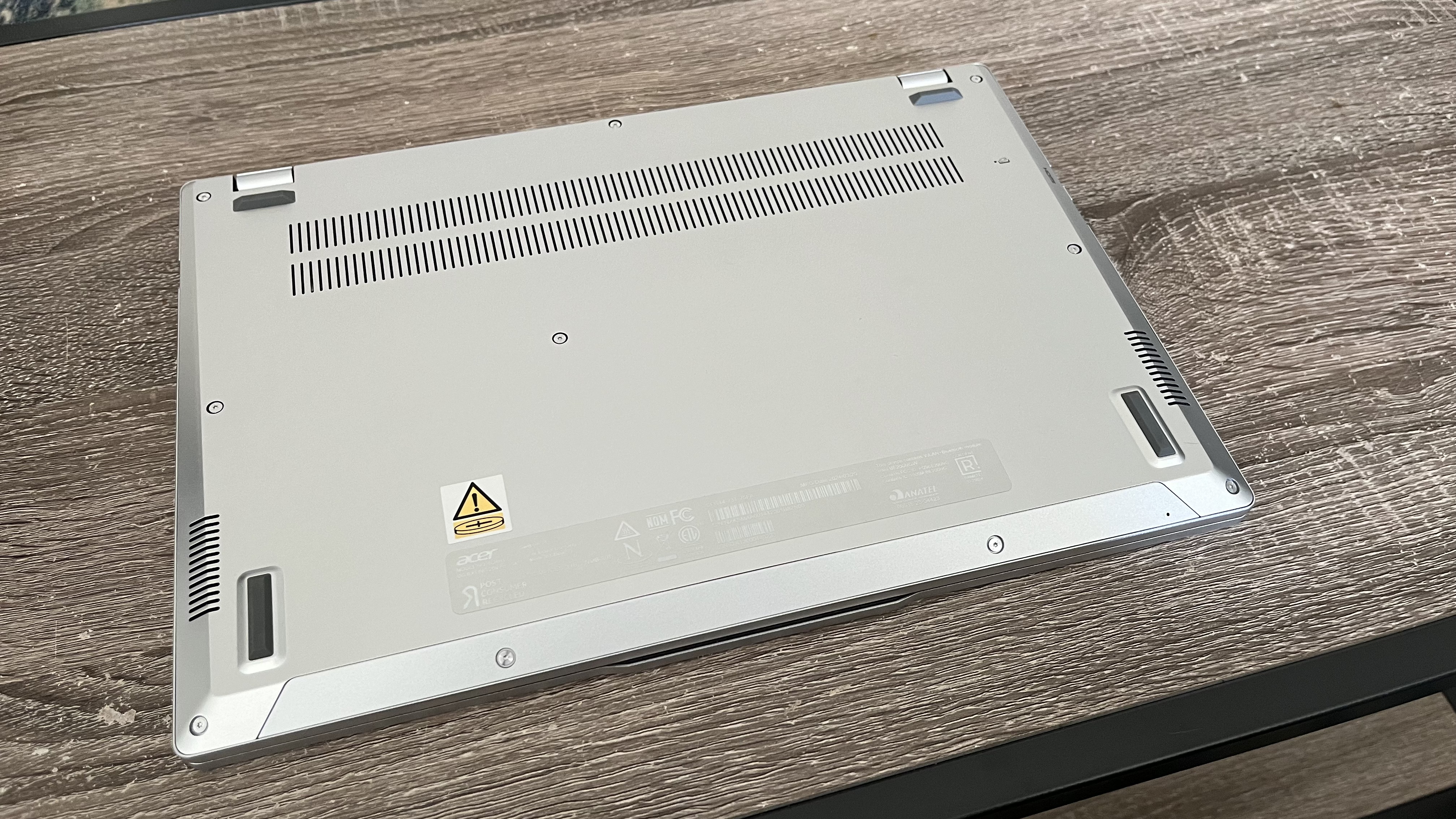
- Mediocre battery life for this form factor
- Keeps its charge when asleep
Considering the Acer Swift Go 14 technically fits into the Ultrabook category, its battery-informant benchmark of eight hours and 25 minutes is pretty underwhelming. Of course, it’s good enough to get you through a day of work without needing a charge, but just barely. While it’s unfair to compare it to something like the Apple MacBook Air 15-inch (M3), which gets almost double the battery life, getting above ten hours is normal these days for a computer like this.
Of course, this laptop does have a slightly higher resolution and built-in AI that might need a little more power, but the battery life is still not anything special. Since it charges via USB-C, it doesn’t take long to get back up to a full charge. And, more interestingly, it does a better job keeping a charge when asleep than many Windows laptops I’ve come across (something Apple has solved a long time ago).
- Battery Life: 4 / 5
Should you buy the Acer Swift Go 14?
Buy the Acer Swift Go 14 if...
Don't buy it if...
Also consider
How I tested the Acer Swift Go 14
- Tested for three weeks
- Used it for work, light gaming, and streaming
- Played around with generative AI
I used the Acer Swift Go 14 for three weeks, using it in a number of different ways. I used it for work, including typing up most of this review (along with the requisite online research). I used it to stream video. I even did some light gaming. On top of that, I tested the webcam and mic as well as the Copilot AI.
After spending time with the Acer Swift Go 14, it’s clear that it’s a mid-range laptop with a few extra features to set it apart. On the whole, though, it’s a solid computer for those who don’t need their computer to do anything particularly fancy.
I’ve spent the last few years reviewing tech gear for gaming and otherwise, where I’ve gotten a feel for what to look for and how to put a piece of kit through its paces to see whether it’s worth the recommendation.
We pride ourselves on our independence and our rigorous review-testing process, offering up long-term attention to the products we review and making sure our reviews are updated and maintained - regardless of when a device was released, if you can still buy it, it's on our radar.
- First reviewed June 2024



0 Comments